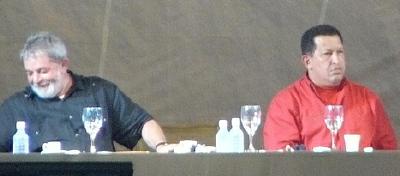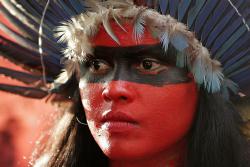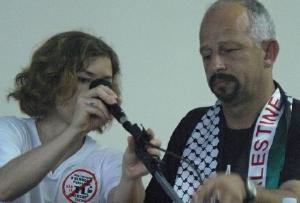Music was in the air. Drenched in a late-afternoon shower, more than 100,000 people with causes and convictions, from 120 countries, filled the streets with dance, drums, and dreams. Their slogans reverberated across the horizons: for a greener earth, for justice, human rights, and for a better world. By the evening, the town was a carnival of protest and poetry—seeking alternatives for a better world. That is how the ninth World Social Forum (WSF) began on January 27th in Belém, the capital city of the Amazonian state of Pará in Brazil.
Scoffing at the WEF in Davos
The first WSF, a yearly event, took place in 2001 and emerged as a platform for discussions, an open space to find alternatives to form a just and humane world, free of poverty and injustice. This WSF acquired a special significance in the context of the ongoing economic crisis. Though the WSF began as a counter-discourse to the World Economic Forum (WEF), it has now emerged as a part of the broader social and political process in many parts of the world.

The highlight of this year’s WSF was the public summit of the Presidents of five Amazonian countries—Brazil, Bolivia, Venezuela, Paraguay, and Ecuador. As Cândido Grzybowski, a founding member of the WSF, said, “For many years, we said the dreams of growth-obsessed, unbridled financial capitalism would bring a nightmare of misery to the people of the world. We proved to be right . . . In 2001, there was no President Lula—he was a participant in the WSF—and there was no President Obama. In 2009, we can say Another World is Possible.”
A special focus on the Amazon region…
 Every WSF has its unique flavor. The most evident aspect of this one was the presence of thousands of indigenous people from the Amazon region. [1] The formal forum began on January 28 with the Pan-Amazon solidarity day to discuss, share, and explore issues of environmental, social and economic justice, which affect the most marginalized communities and people in the Amazon region. Environmental Justice was one of the key issues of the forum. [2] Father Leonardo Boff, the famous liberation-eco-theologian, poetically and philosophically talked about the high fever of Mother Earth and the need for nurturing and caring for the earth.
Every WSF has its unique flavor. The most evident aspect of this one was the presence of thousands of indigenous people from the Amazon region. [1] The formal forum began on January 28 with the Pan-Amazon solidarity day to discuss, share, and explore issues of environmental, social and economic justice, which affect the most marginalized communities and people in the Amazon region. Environmental Justice was one of the key issues of the forum. [2] Father Leonardo Boff, the famous liberation-eco-theologian, poetically and philosophically talked about the high fever of Mother Earth and the need for nurturing and caring for the earth.
... with lighting on the rest of the world
The anger against the bombing of Gaza and the exhibition for the Palestinian cause received much support at the Federal University of Pará (UFPA) campus, one of the key venues of the forum.
 The 50th-year celebration of the Cuban Revolution drew attention. Professor David Harvey, the urban theorist, spoke about a new people’s movement for the Right to City. Before more than 1,000 people, Harvey concluded his presentation on the present economic crisis and its impact on the poor: “We have to ask the question: What is more important, the value of the banks or the value of humanity? The banking system should serve the people, not live off the people. The only way in which we are really going to be able to exert the right to the city is by taking command of the capitalist surplus absorption problem. We have to socialize the capital surplus and use it to meet social needs.”
The 50th-year celebration of the Cuban Revolution drew attention. Professor David Harvey, the urban theorist, spoke about a new people’s movement for the Right to City. Before more than 1,000 people, Harvey concluded his presentation on the present economic crisis and its impact on the poor: “We have to ask the question: What is more important, the value of the banks or the value of humanity? The banking system should serve the people, not live off the people. The only way in which we are really going to be able to exert the right to the city is by taking command of the capitalist surplus absorption problem. We have to socialize the capital surplus and use it to meet social needs.”
South-South Solidarity among Africa, Asia, and Latin America proved to be an outcome of the social-forum process globally. Wahu Kaara, the fiery activist from Nairobi, summed up the spirit: “We need authentic democratization of people—across gender, race and continents. We do not need imported and packaged democracy from the USA, a democracy driven by big money and big corporations.”
The WSF is many things to many people …
With hundreds of seminars, discussions, debates, stalls, and around 150,000 people, the WSF can look like a fair of confusion and causes. The WSF is many things to many people. For some it is about digital democracy, free software and mobilization. For others, it is all about indigenous people. The WSF is less about final solutions and resolutions. It is more about explorations, shared journeys, and a collective search for alternatives. The WSF signifies the pluralism, diversity and dispersion of the world in terms of language, ideas, and actions.
… and might need to be reinvented with greater focus
One of the main criticisms against the WSF is its seeming anarchy and its willingness to provide space to all kinds of cause junkies. The eco-porn group and the nudist groups made their presence by marching in the evening. Then there was the Hare Krishna group promoting vegetarianism and the bhakti cult. Many of the actors and organizations may not have been committed to the WSF charter. While such diversity makes the WSF interesting and colorful, it can also distract attention from the serious business of searching for a viable political and policy alternatives for a better world.
The increasingly chaotic nature of events and participation may demand the WSF to be more focused and organized in terms of issues, ideas, and participation. The WSF may have to be reinvented to meet new challenges of an emerging world and world order.
 Photo credits under Creative Commons licence:
Photo credits under Creative Commons licence:
 Israel and Palestine speakers, demonstration, and Presidents Lula and Chavez by Luis Carlos Díaz, periodismo de paz
Israel and Palestine speakers, demonstration, and Presidents Lula and Chavez by Luis Carlos Díaz, periodismo de paz
 Amazonian portrait by Wilfried Maurin
Amazonian portrait by Wilfried Maurin



